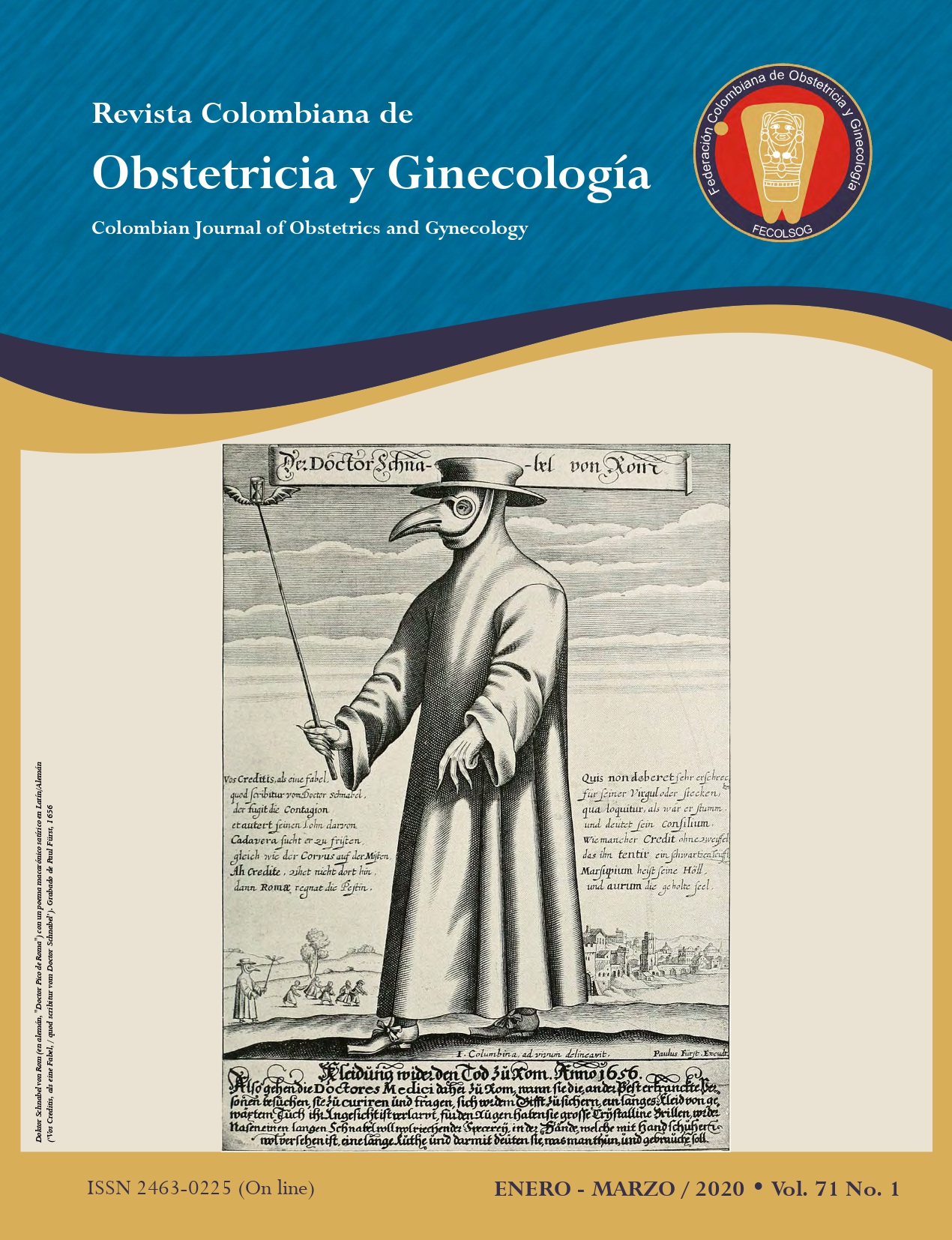Assessment of the efficacy and safety of chloroquine monotherapy for the treatment of acute uncomplicated gestational malaria caused by P. vivax, Córdoba, Colombia, 2015-2017
DOI:
https://doi.org/10.18597/rcog.3370Abstract
Objective: To determine the efficacy of chloroquine monotherapy in Colombian pregnant women with acute uncomplicated malaria vivax (GMV). Materials and methods: Prospective cohort study in pregnant women who presented of their own accord between February 1, 2015 and December 31, 2017 to malaria or prenatal care centers in two Colombian towns and in whom the diagnosis of Plasmodium vivax was confirmed by means of blood spot test and qPCR. Measured variables included sociodemographics, therapeutic failure (TF) and serious adverse events at 28 days and frequency of recurrence-relap (RR) over a follow-up period of 120 days. The WHO protocol was applied for the assessment of monotherapy with cloroquine (m-CQ) efficacy. Results: Overall, 47 pregnant women were identified. During the 28-day follow-up period there were no losses, and there were two cases of TP (4.2%=2/47). Of the 45 women followed between 29 and 120 days, 11 were lost (24.4%=11/45) and there were 13 cases of RR, with an RR frequency ranging between 29 and 53 % depending on the type of analysis. Conclusions: Chloroquine is still highly effective as a cure of acute malaria vivax attack in GM in Colombia, and continues to be a good option for the treatment of acute phase GM. The RR frequency is high. Studies are required that evaluate therapeutic alternatives in MG. There is a pressing need for medications and/or procedures that can help reduce this very high risk.
Author Biographies
Carlos J. Castro-Cavadía, Universidad de Antioquia
Bacteriólogo; estudiante de doctorado, Corporación de Ciencias Básicas Biomédicas, Universidad de Antioquia, Medellín, Colombia.
Jaime Carmona-Fonseca, Universidad de Antioquia
Médico, epidemiólogo, salubrista, microbiólogo; profesor titular, Facultad de Medicina, Universidad de Antioquia, Medellín, Colombia.
References
Carmona-Fonseca J, Agudelo-García OM, Arango-Flórez E. Eficacia terapéutica y eventos adversos de tratamientos para malaria vivax y malaria falciparum en gestantes en las regiones de Urabá y Alto San Jorge, Colombia, 2008-2011. Rev Colomb Obs y Ginecol. 2013;64(1):27-37.
https://doi.org/10.18597/rcog.127
Carmona-Fonseca J, Maestre A. Incidencia de las malarias gestacional, congénita y placentaria en Urabá (Antioquia, Colombia).
https://doi.org/10.18597/rcog.351
World Health Organization (WHO). Methods for surveillance of antimalarial drug efficacy. Geneva: WHO; 2009.
World Health Organization (WHO). Compendium of who malaria guidance. Prevention, diagnosis, treatment, surveillance and elimination. Geneva: WHO; 2019.
Beutler E. Glucose-6-phosphate dehydrogenase deficiency. Diagnosis, clinical and genetic implications. Am J Clin Pathol. 1967;47(3):303-11. Disponible en: https://www.ncbi.nlm.nih.gov/pubmed/5335657
https://doi.org/10.1093/ajcp/47.3.303
Carmona-Fonseca J, Álvarez G, Ríos A, Vásquez MF. Deficiencia de glucosa 6-fostato deshidrogenasa en hombres sanos y en pacientes maláricos, Turbo (Antioquia, Colombia). Rev Bras Epidemiol. 2008;11(2):252-65. https://doi.org/10.1590/S1415-790X2008000200007
Carmona-Fonseca J, Alvarez G, Maestre A. Methemoglobinemia and adverse events in Plasmodium vivax malaria patients associated with high doses of primaquine treatment. Am J Trop Med Hyg. 2009;80(2):188-93. Disponible en: https://www.ncbi.nlm.nih.gov/pubmed/19190211
https://doi.org/10.4269/ajtmh.2009.80.188
Duarte EC, Pang LW, Ribeiro LC, Fontes CJ. Association of subtherapeutic dosages of a standard drug regimen with failures in preventing relapses of vivax malaria. Am J Trop Med Hyg. 2001;65(5):471-6. Disponible en: https://www.ncbi.nlm.nih.gov/pubmed/11716100
https://doi.org/10.4269/ajtmh.2001.65.471
Baird JK. Effectiveness of antimalarial drugs. N Engl J Med. 2005;352(15):1565-77. Disponible en: https://www.ncbi.nlm.nih.gov/pubmed/15829537
https://doi.org/10.1056/NEJMra043207
Santos JB, Luz F, Deckers FA, Tauil PL. Subdoses of primaquine in overweight patients and malaria vivax relapses: Report of two cases in the Federal District, Brazil. Rev Soc Bras Med Trop. 2010;43(6):749-50. Disponible en: https://www.ncbi.nlm.nih.gov/pubmed/21181040
https://doi.org/10.1590/S0037-86822010000600033
Orton L, Garner P. Drugs for treating uncomplicated malaria in pregnant women. Cochrane Database Syst Rev. 2005/07/20. 2005;(3):CD004912. Disponible en: https://www.ncbi.nlm.nih.gov/pubmed/16034957
World Health Organization (WHO). A general guide for the assessment of therapeutic efficacy of chloroquine for vivax malaria (working draft). Version 3. Geneva: WHO; 2001.
Ruebush TK, Zegarra J, Cairo J, Andersen EM, Green M, Pillai DR, et al. Chloroquine-resistant Plasmodium vivax malaria in Peru. Am J Trop Med Hyg. 2003;69(5):548-52. Disponible en: https://www.ncbi.nlm.nih.gov/pubmed/14695094
https://doi.org/10.4269/ajtmh.2003.69.548
Phillips EJ, Keystone JS, Kain KC. Failure of combined chloroquine and high-dose primaquine therapy for Plasmodium vivax malaria acquired in Guyana, South America. Clin Infect Dis. 1996;23(5):1171-3. Disponible en: https://www.ncbi.nlm.nih.gov/pubmed/8922821
https://doi.org/10.1093/clinids/23.5.1171
Bergqvist Y, Domeij-Nyberg B. Distribution of chloroquine and its metabolite desethyl-chloroquine in human blood cells and its implication for the quantitative determination of these compounds in serum and plasma. J Chromatogr. 1983;272(1):137-48. Disponible en: https://www.ncbi.nlm.nih.gov/pubmed/6841533
https://doi.org/10.1016/S0378-4347(00)86110-1
Whitby M. Drug resistant Plasmodium vivax malaria. J Antimicrob Chemother. 1997;40(6):749-52. Disponible en: https://www.ncbi.nlm.nih.gov/pubmed/9462425
https://doi.org/10.1093/jac/40.6.749
Garavelli PL, Corti E. Chloroquine resistance in Plasmodium vivax: The first case in Brazil. Trans R Soc Trop Med Hyg. 1992;86(2):128.
https://doi.org/10.1016/0035-9203(92)90535-K
Alecrim M das G, Alecrim W, Macêdo V. Plasmodium vivax resistance to chloroquine (R2) and mefloquine (R3) in Brazilian Amazon region. Rev Soc Bras Med Trop. 1999;32(1):67-8. Disponible en: https://www.ncbi.nlm.nih.gov/pubmed/9927829
https://doi.org/10.1590/S0037-86821999000100013
Soto J, Toledo J, Gutierrez P, Luzz M, Llinas N, Cedeño N, et al. Plasmodium vivax clinically resistant to chloroquine in Colombia. Am J Trop Med Hyg. 2001;65(2):90-3. Disponible en: https://www.ncbi.nlm.nih.gov/pubmed/11508397
https://doi.org/10.4269/ajtmh.2001.65.90
Ríos A, Álvarez G, Blair S. Diez años de eficacia terapéutica de la cloroquina en malaria no complicada por Plasmodium vivax, Turbo, Antioquia, años 2002 y 2011. Biomédica. 2013;33(3):429-38.
https://doi.org/10.7705/biomedica.v33i3.1631
Popovici J, Pierce-Friedrich L, Kim S, Bin S, Run V, Lek D, et al. Recrudescence, reinfection, or relapse? A more rigorous framework to assess chloroquine efficacy for plasmodium vivax malaria. J Infect Dis. 2019;219(2):315-22. Disponible en: https://www.ncbi.nlm.nih.gov/pubmed/30102351
https://doi.org/10.1093/infdis/jiy484
Carmona-Fonseca J. Recurrencias de malaria por Plasmodium vivax según el uso de primaquina: análisis de estudios descriptivos longitudinales. Rev Bras Epidemiol. 2012;15(3):488-503.
https://doi.org/10.1590/S1415-790X2012000300005
Carmona-Fonseca J. Primaquine and relapses of Plasmodium vivax. Meta analysis of controlled clinical trials. Rev Bras Epidemiol. 2015;18(1):174-93. Disponible en: https://www.ncbi.nlm.nih.gov/pubmed/25651020
https://doi.org/10.1590/1980-5497201500010014
Arias-Gómez J, Villasís-Keever MÁ, Miranda-Novales MG. El protocolo de investigación III: la población de estudio. Rev Alerg México. 2016;63(2):201-6.
https://doi.org/10.29262/ram.v63i2.181
Martínez-Bencardino C. Estadística y Muestreo (13 ed.). Bogotá: ECOE; 2012. p. 303-320.
Carmona-Fonseca J. Malaria vivax en niños: recurrencias con dosis total estándar de primaquina dada en 3 vs. 7 días. Iatreia. 2009;22(1):10-20.
Mesa-Echeverry E, Niebles-Bolivar M, Tobon-Castano A. Chloroquine-Primaquine therapeutic efficacy, safety, and plasma levels in patients with uncomplicated plasmodium vivax malaria in a colombian pacific region. Am J Trop Med Hyg. 2019;100(1):72-7.
https://doi.org/10.4269/ajtmh.18-0655
Carmona-Fonseca J, Maestre A. Prevention of Plasmodium vivax malaria recurrence: Efficacy of the standard total dose of primaquine administered over 3 days. Acta Trop. 2009;112(2):188-92. Disponible en: https://www.ncbi.nlm.nih.gov/pubmed/19653988
https://doi.org/10.1016/j.actatropica.2009.07.024
Carmona-Fonseca J, Alvarez G, Blair S. Malaria por Plasmodium vivax: curación del ataque agudo con tres dosis diferentes de primaquina y dosis fija de cloroquina; Antioquia, Colombia, 2003-2004. Biomedica. 2006;26(3):353-65. Disponible en: https://www.ncbi.nlm.nih.gov/pubmed/17175999
https://doi.org/10.7705/biomedica.v26i3.354
Shokoples SE, Ndao M, Kowalewska-Grochowska K, Yanow SK. Multiplexed real-time PCR assay for discrimination of Plasmodium species with improved sensitivity for mixed infections. J Clin Microbiol. 2009;47(4):975-80.
https://doi.org/10.1128/JCM.01858-08
Lazcano-Ponce E, Salazar-Martinez E, Gutiérrez-Castrelló P, Angeles-Llerenas A, Hernández-Garduño A, Viramontes JL. Ensayos clínicos aleatorizados: variantes, métodos de aleatorización, análisis,consideraciones éticas y regulación. Salud Pública de México. 2004;46(6):559-84.
https://doi.org/10.1590/S0036-36342004000600012
Armijo-Olivo S, Warren S, Magee D. Intention to treat analysis, compliance, drop-outs and how to deal with missing data in clinical research: A review. Phys Ther Rev. 2009;14(1):36-49.
https://doi.org/10.1179/174328809X405928
Zuluaga-Idárraga L, Blair S, Akinyi Okoth S, Udhayakumar V, Marcet PL, Escalante AA, et al. Prospective study of Plasmodium vivax malaria recurrence after radical treatment with a chloroquine-primaquine standard regimen in Turbo, Colombia. Antimicrob Agents Chemother. 2016;60(8):4610-9. Disponible en: https://www.ncbi.nlm.nih.gov/pubmed/27185794
https://doi.org/10.1128/AAC.00186-16
Blair S, Tobón-Castaño A, Echeverri M, Alvarez Sánchez Bact G, Carmona-Fonseca J. Adecuada respuesta clínica y parasitológica de Plasmodium vivax a la cloroquina en Colombia (Turbo, Antioquia), 2001. 2002;6(1):21-6.
Castillo CM, Osorio LE, Palma GI. Assessment of therapeutic response of Plasmodium vivax and Plasmodium falciparum to chloroquine in a Malaria transmission free area in Colombia. Mem Inst Oswaldo Cruz. 2002;97(4):559-62.
https://doi.org/10.1590/S007402762002000400020
Pérez MA, Cortés LJ, Guerra AP, Knudson A, Usta C, Nicholls RS. Eficacia de la combinación amodiaquina más sulfadoxinapirimetamina y de la cloroquina para el tratamiento del paludismo en Córdoba, Colombia, 2006. Biomédica. 2008;28(1):148-59. Disponible en: https://revistabiomedica.org/index.php/biomedica/article/view/699
https://doi.org/10.7705/biomedica.v28i1.699
Blair S, Tobón-Castaño A, Echeverri M, Alvarez Sánchez Bact G, Carmona-Fonseca J. Adecuada respuesta clínica y parasitológica de Plasmodium vivax a la cloroquina en Colombia (Turbo, Antioquia), 2001. 2002;6(1):21-6.
Alvarez G, Piñeros JG, Tobón A, Ríos A, Maestre A, Blair S, et al. Efficacy of three chloroquineprimaquine regimens for treatment of Plasmodium vivax malaria in Colombia. Am J Trop Med Hyg. 2006;75(4):605-9.
Barañao RI. Inmunología del embarazo. Invest Clin. 2011;52(2):175-94.
Racicot K, Kwon JY, Aldo P, Silasi M, Mor G. Understanding the complexity of the immune system during pregnancy. Am J Reprod Immunol. 2014;72(2):107-16. Disponible en: https://www.ncbi.nlm.nih.gov/pubmed/24995526
https://doi.org/10.1111/aji.12289
Mor G, Cardenas I. The immune system in pregnancy: A unique complexity. Am J Reprod Immunol. 2010;63(6):425-33. Disponible en: https://www.ncbi.nlm.nih.gov/pubmed/20367629
https://doi.org/10.1111/j.1600-0897.2010.00836.x
Commons RJ, Simpson JA, Thriemer K, Humphreys GS, Abreha T, Alemu SG, et al. The effect of chloroquine dose and primaquine on Plasmodium vivax recurrence: A WorldWide Antimalarial Resistance Network systematic review and individual patient pooled meta-analysis. Lancet Infect Dis. 2018;18(9):1025-34.
Nosten F, McGready R, d’Alessandro U, Bonell A, Verhoeff F, Menendez C. Antimalarial drugs in pregnancy: A review. Curr Drug Saf. 2006;1.
https://doi.org/10.2174/157488606775252584
Cooper RG. Chloroquine and pregnancy. Indian J Physiol Pharmacol. 2007;51(4):418-20.
WHO. World Health Organization. Guidelines for the treatment of malaria. 2 ed. Geneva: WHO; 2010.
How to Cite
Downloads
Downloads
Published
Issue
Section
Funding data
-
Departamento Administrativo de Ciencia, Tecnología e Innovación (COLCIENCIAS)
Grant numbers 111-5777-57051
| Article metrics | |
|---|---|
| Abstract views | |
| Galley vies | |
| PDF Views | |
| HTML views | |
| Other views | |
















